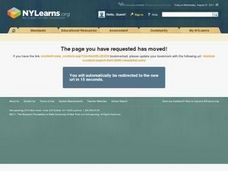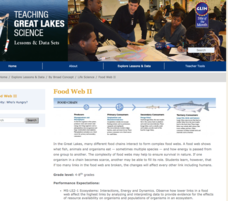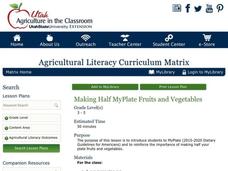Curated OER
Food Chains
Fourth graders study food chains, producers, consumers, and decomposers. They play a food chain game and create food chain mobiles or posters. They take a nature hike around the school and observe various parts of a food chain.
Curated OER
High-Tech Food: Science in Your Shopping Cart
Kids are given a lot to think about, as they delve into the world of high-tech foods. They discuss GMOs, biotechnology, food enhancements and domestication. They view videos, engage in class discussions, complete worksheets, and learn...
NOAA
An Ocean of Energy
Young biologists trace the path of the sun's energy through marine ecosystems in the second part of this four-lesson plan series. Building on prior knowledge about producers, consumers, and decomposers students are introduced to the...
Baylor College
Plant Parts You Eat
Plants provide a variety of delicious foods essential for human survival. In the fourth lesson of this series on food science, young scientists investigate common fruits, vegetables, and grains in order to determine which plant part is...
Curated OER
Forest Food Chains and Webs
Students explore forest ecological systems. In this ecology lesson, students classify forest plants and animals according to their ecological roles. Students play a related vocabulary guessing game. Students choose a card on which a...
Curated OER
Food Webs
Sixth graders discuss and describe consumers and producers. They discuss and describe predator-prey relationship. Students review food chains. They form a circle, and each student is given an ecosystem card. Student at the top is given...
Curated OER
Producers and Consumers
Students make lists of producers and consumers and act as consumers that eat producers in a garden. In this producers and consumers lesson plan, students demonstrate a food chain by using a piece of yarn to connect all of them together.
Captain Planet Foundation
Energy Flow in the Garden
How can you tell what an owl has eaten? Study the food chain and flow of energy in an ecosystem by dissecting an owl pellet and noting the bones found inside. Additionally, the lesson plan includes a game about consumers and producers...
Curated OER
it's Lonely At The Top
Students explore the differnences between food producers in food webs and food consumers in food chains. Behavioral choices of primary and secondary consumers such as herbivores, vegetarians, carnivors, and omnivors are analyzed.
Baylor College
Serving Sizes
Are serving sizes for different foods always appropriate for what you need? In this hands-on activity, learners work in groups to estimate what one serving size of various foods are, and then evaluate their hypotheses by measuring real...
Curated OER
Food Fat
High schoolers evaluate snack foods based on calories and fat. In small groups, they use this information to make informed and wise food choices. Students graphically represent the fat in a food by measuring the equivalent of the food...
Curated OER
Tropical Forest Food Chain
Learners explore the interdependence of the animals and plants in tropical rainforests. They explore the importance of conserving biodiversity and tropical food chains. They create a tropical forest food chain and identify species that...
Curated OER
Energy Flow and the Food Chain
Students complete discussions and worksheets about the Hawaiian food chain. In this food chain lesson plan, students research decomposers, consumers, and producers.
Curated OER
Create a Food Chain
Students discover the connection between plants and animals by discussing simple food chains. Students explore what may happen when parts of a food chain are removed. Students wrap up the lesson by writing a story about a food chain.
Curated OER
Amazon Food Chain
Explore food chains in the Amazon Rainforest using this resource. Learners discuss the predator vs. prey relationships in the food chain. Then, they create a food web to describe this relationship. This is a simple and effective way to...
Curated OER
Costa Rican Food Chain
Discuss the animals and plants in the rainforest food chain using this lesson. Learners talk about and do research on the top predators from the Costa Rican region and create a model of one of them in class. They also make a visual model...
Curated OER
Food Chains
Pupils classify organisms into the food chain. They relate their reading from The Midnight Fox by Betsy Byars to the food chain. They also classify organisms as herbivore, carnivore, producer, consumer, predator and prey.
Curated OER
Looking at Food Labels
High schoolers interpret the food and nutrition on food labels. They determine their nutrient needs and how comprehending food labels can help them to meet those needs. Pupils recall that food labels provide nutrition information to help...
Curated OER
Cut and Paste Food Chain
Students study life science. In this food chain lesson, students discover the different types of animals that make up an ecosystem. They discuss as a class and then work independently on a food chain activity. This lesson includes a...
Curated OER
Kitchen Vocabulary Words
Working in groups of four, class members sort cards, labeled with kitchen equipment vocabulary words, into groups based on function, i.e., mixing tools, measurement tools, serving tools, baking pans, stove top pans, or preparation tools....
Michigan Sea Grant
Food Web II
A food web consists of complex food chains and the more complex the web, the better likelihood of survival. Learners compare and contrast food webs and food chains and discuss concepts like the predator-prey and consumer-producer...
Polar Trec
Arctic Smorgasbord!
Two blooms of phytoplankton, instead of just one, now occur in the Arctic due to declining sea ice, which will have widespread effects on the marine life and climate. In small groups, participants build an Arctic food web with given...
NOAA
Seafood and Human Health
Whether your young biologists realize it or not, humans play a significant role in marine ecosystems. To help them understand this fact children first create graphical representations that show homo sapiens' place in marine food chains,...
Agriculture in the Classroom
Making Half MyPlate Fruits and Vegetables
Establish healthy eating habits with a lesson plan focused around MyPlate's food recommendations and the importance of eating fruits and vegetables. Through class discussion and worksheet completion, scholars discuss the best choices of...

























